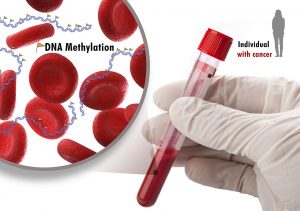What exactly does ‘epigenetic’ mean? Well epigenetic literally means “in addition to changes in genetic sequence.” The term now means any procedure to change genetic activity without changing the sequence of the actual DNA. So why is this important? Epigenetics can affect a lot of scientific research. For example DNA methylation is a hugely important epigenetic modification.
DNA methylation is where a methyl group would be added to a cytosine in a DNA sequence changing its function. This can be used in embryonic development, X-chromosome inactivation, genomic imprinting, gene suppression, carcinogenesis and chromosome stability. This means DNA methylation is very vital to growth and development- as it is a natural process- however can affect bad cells.
Examples of this are with cancer cells. DNA Methylation patterns- adding a group- are interrupted and changed when cancer is present. DNA methylation done on the promoters in tumor cells can turn off the expression of genes. In humans this can cause disruption of vital developmental pathways. This was then tested in an experiment (for now we will only observe human results because it was tested on mice as well) They tested human normal brain tissue vs. cancerous.
After testing the DNA methylation patterns on tumors, they found that 121 loci (loci is the central “hot spot” of genes) had strong methylation compared to the normal brain tissue which had 60% less. So what does all this mean??
Basically DNA methylation is a good thing in a normal environment. When cancer is present DNA methylation can change and be harmful in a negative environment such as a tumor because it causes hypermethylation.
While the take away is essentially the obvious- cancer is bad- scientists can use this data to find a correct cure for cancer and to create better medicine as some can harm even more by increasing DNA methylation in tumors. For more information on this click here.



Leave a Reply